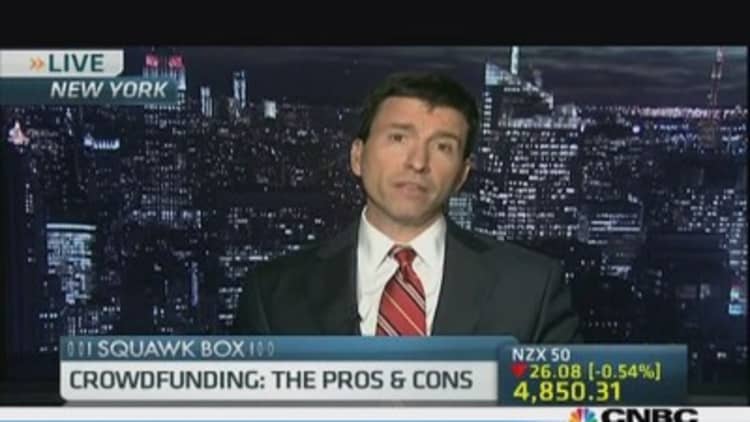As one of the pioneers in the industry, Indiegogo was pleased with the SEC's recently released rules proposal for Regulation Crowdfunding, as dictated by the JOBS Act of 2012. The long-awaited rules, which were a year and a half in the making, lay the ground rules for investment crowdfunding. This will expand the crowdfunding industry, which will already raise more than $5 billion for start-ups, causes and creative projects this year alone, according to Massolution, a market research firm.
In a major shift, the preliminary rules allow small businesses to raise up to $1 million a year in equity financing from unaccredited investors without the expense of a traditional public offering. Companies can use these rules simultaneously alongside private placements to raise larger amounts.
That's a victory, and it can alter the way entrepreneurs raise money to launch and grow their businesses. Until now, companies could only raise investment money privately from accredited investors—high net-worth individuals.
(Read more: Emerging entrepreneurial hot spots)
The change will democratize start-up and small-business financing, and it will create an equal-opportunity playing field where entrepreneurs can test and validate their concepts.
I'm excited for three reasons. First, I believe making fundraising more efficient and fair will fuel our economy. Second, the way the rules are being written shows that the SEC is embracing the collaborative ethos of crowdfunding. For example, much of the proposal's 585 pages discuss the comments sent in by the public. And it explicitly solicits additional input from the public.
Just as important, the rules strike a good balance—at least, within the limits imposed by the law itself—between offering clear protective restraints and empowering platforms to innovate and develop best practices. Indiegogo has proved that risks can be mitigated through an open platform that supports free communication and maintains constant vigilance through fraud-detection algorithms and automated processes.
(Read more: You hear lots about crowdfunding, but what is it?)
From an investor's point of view, the proposed rules help protect them from fraud. The proposal limits how much people could invest and requires companies to disclose certain information, such as GAAP (generally-accepted accounting principles) financials, resumes of company principals, a high-level cap table and detailed use of proceeds. People with an annual and net worth of less than $100,000 could invest a maximum of 5 percent of their yearly income. Those with higher incomes could invest up to 10 percent.
We need rules like these because they will help our economy. The SBA reports that small businesses create more than half of our country's non-farm private wealth and generate 65 percent of its new jobs. But according to Biz2Credit, one of the nation's leading small-business lending portals, only about 16 percent ever get approved for loans from a large bank.
Most of us cannot invest in small companies, because of federal securities laws written in the 1930s, when there was no way for an ordinary citizen to vet a smooth voice on the phone, fancy letterhead, and a New York City postmark. These regulations made sense at the time, but they also created a two-tier system that has locked Main Street businesses out of traditional finance—including my parents, who ran a local moving company for 33 years—as well as lock Main Street investors, or what most refer to as "the 99 percent," out of angel and venture investing.
So I'm glad that in many aspects of their rule-making, the SEC defined what to do without dictating how to do it. This allows platforms like Indiegogo to perform controlled experiments with real-world user data to determine what methodologies will work best for investors and businesses raising funds.
(Read more: Crazy crowdfunding: Bug gun, squirrels and more)

For example, the rules require us to take measures to educate customers and to mitigate fraud but allow us to figure out the specific execution of both. The rules stipulate that platforms can't make subjective recommendations but still allow for platforms to leverage the latest technology to make objective recommendations.
This is particularly good news for platforms like us, who help campaigns today raise money from outside their immediate networks through innovations in big data, search and recommendation engines.
Finally, it's great to see that the rules include a directive to support open communication, such as discussion forums, to help people make their funding decisions. This requirement was actually overlooked by the JOBS Act. We know from nearly six years of experience in the industry that open communication is absolutely essential. In a competitive environment this "what, not how" approach to regulation will ensure that crowdfunding participants will get the best user experience, raising investment money efficiently, fairly and safely.
In all, this is a great moment in history. Who knew back in 2010 that starting a campaign on Indiegogo to change the laws around crowdfunding would actually work? But it did, which just goes to show that anything is possible when you give people the opportunity to succeed. As the founder of the largest global open platform dedicated to helping people fund what matters to them, I'm excited to figure out how we can empower people even more.
—By Danae Ringelmann, Special to CNBC.com
Ms. Ringelmann is a CFA, and co-founder and chief customer officer of Indiegogo. Follow her on Twitter @lindarottenberg.




